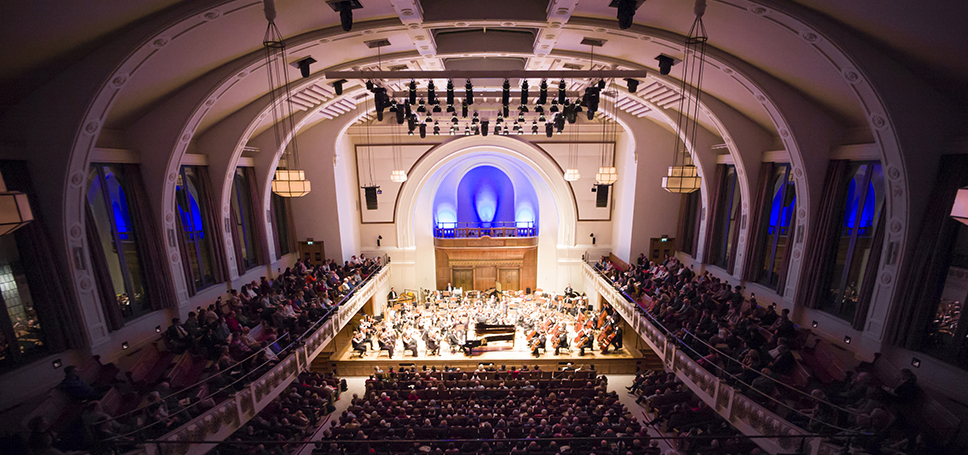Orchestras that appeal directly to younger audiences, tackle inclusion, support wellbeing and invest in education programmes are more likely to attract support from businesses in the post-Covid world, according to new research from the Royal Philharmonic Orchestra (RPO).
At a time when the arts sector is in great need of philanthropic support following more than a year of COVID-related challenges, the RPO study asked more than 900 businesses what they would look for from an orchestra if they were to consider committing financial support in the next few years.
While the quality of performances topped the list of priorities (27%), the research indicates the importance that corporates placed on a wide range of broader issues. More than one in five businesses (22%) said they would be more likely to support an orchestra if it could demonstrate its work was broadening the genre’s appeal to younger audiences. In addition, 21% placed great importance on how the arts supported health and wellbeing, social inclusion and education work in the community.
The perceived importance of orchestras doing more to appeal to young people and supporting inclusion also played out in businesses being drawn to ensembles that reflected these issues in the music they played. Overall, 19% of businesses placed importance on the diversity of repertoire that an ensemble played – and 15% rated the importance of orchestral music having powerful creative synergies with other areas of the arts, such as film and gaming.
The business community’s view on the arts doing more to appeal to young people is timely. The RPO’s latest research also revealed that younger people would be leading the return to concert halls in the months ahead. With restrictions easing, three-times as many young people planned to go to a live concert as soon as they possibly could (17% of under 35s compared to 5% of over 55s). Nearly half (46%) of people under 35 planned to attend a live concert within the next three months, compared with just 14% of people aged over 55.
After a year of unprecedented economic uncertainty, businesses were also drawn to orchestras that could demonstrate strength and the power to endure. One in five businesses placed importance on an ensemble’s financial strength – and a similar proportion believed the history and reputation of an orchestra was important.
Most important attributes to businesses considering supporting a classical music organisation
|
Quality of performances |
27% |
|
Appeal to young audiences |
22% |
|
Support for health and wellbeing |
21% |
|
History and reputation |
21% |
|
Education work |
21% |
|
Financial stability |
20% |
|
Supporting social inclusion / mobility |
20% |
|
Diversity of repertoire |
19% |
|
How hard the organisation works |
16% |
|
Involvement with other arts (e.g. film and gaming) |
15% |
|
Prestige / brand association |
15% |
|
Digital capabilities and reach |
15% |
|
The potential to broaden brand reach |
15% |
|
Regional tours |
15% |
|
Corporate hospitality/client rewards/benefits |
13% |
|
International footprint |
13% |
Huw Davies, Deputy Managing Director of the Royal Philharmonic Orchestra commented:
“As we re-emerge from a succession of lockdowns, the economic landscape for orchestras will be different. Support from the two Culture Recovery Funds has been a lifeline to many ensembles, but, moving forward, orchestras are going to need to become more commercially savvy and self-reliant to survive.
“Our research from the business community presents a clear picture of their terms of engagement with orchestral music. The good news is that the appetite for support and collaboration is there, but it is no longer just about playing concerts. Sponsors and corporate partners expect orchestras to make a positive, enriching impact on society. At the RPO, we have put inclusion and diversity at the top of our agenda, our repertoire is unmatched for its diversity and RPO Resound has grown to become the most innovative and respected community and education programme in the UK and internationally.”
As the London orchestra least dependent on Arts Council funding, the RPO has a long-standing tradition of developing lasting partnerships with the corporate sector. This week, LG SIGNATURE became the latest international company to enter into a corporate partnership with the Orchestra. LG SIGNATURE is an ultra-premium brand across multiple product categories from global innovator LG Electronics. The business is keen to support the RPO’s education, community and inclusion work and the partnership will also deliver culturally enriching benefits to LG’s business. This will involve exclusive RPO content for LG SIGNATURE customers, concert experiences and programme branding. Vasily Petrenko, the Orchestra’s new Music Director, will also become an ambassador for the LG brand.
Bumseop Lee, President of LG Electronics UK, added:
“As a brand, LG SIGNATURE is committed to supporting arts around the world. Collaborating with RPO, a brand that shares our core values of enriching lives through excellence, is a hugely exciting moment for us. The arts have played a vital role to help people through an unprecedented global pandemic and now is an important time for the corporate world to show leadership and help to secure the future of the arts at a critical time. At LG SIGNATURE we are delighted to lead from the front - and at a time when it matters most.”

